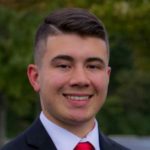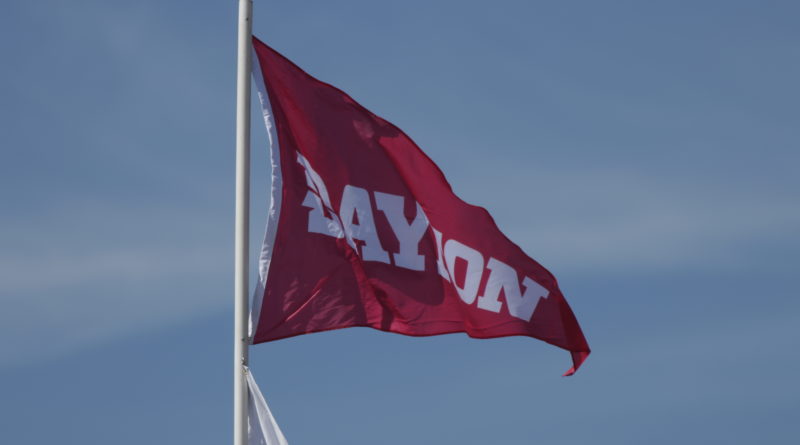UD football’s reaction to cancellation of fall season
The University of Dayton football team faces a fall without games for the first time in 75 years, but has the right foundation to face the cancellation of their season. Photo courtesy of Flyer News.

Peter Burtnett
Sports Editor
With the cancellation of the fall football season at the University of Dayton by the Pioneer Football League, the Flyers face a season without games for the first time since 1945.
But even in the difficult circumstances brought on by the COVID-19 pandemic, head coach Rick Chamberlin said the team’s foundation is too strong to be broken by the cancellation.
“We’ll be okay,” Chamberlin said. “This football program will be just fine, it has too strong of a foundation and too many good people both on the team and administrative support staff. We’re going to have something positive out of this fall.”
No matter how strong the foundation, though, Chamberlin said finding out the fall season would be cancelled was still a disappointment, but not a great shock or “out of the blue.”
Starting quarterback Jack Cook and safety Brandon Easterling, both seniors, shared a similar sentiment. Cook said the delay was more frustrating than the decision itself, while Easterling said finding out was still heartbreaking.
“I mean, I think my reaction was probably pretty standard throughout the team, and it was just heartbreaking,” Easterling said. “One thing I will say, I think (Athletic Director) Neil (Sullivan) and coach Chamerberlin did a great job of being transparent and realistic with us. And prior to that meeting, a few weeks before they had even told us, ‘Guys, honestly, we’re not counting it out, we’re still going to fight for you,’ but they told us, ‘It’s not looking the best.’”
Transparency, which was highlighted by both Chamberlin and Easterling, is something that has been lacking from some other college football programs, with players from Colorado State and Florida State claiming the rejection or neglection of COVID-19 protocols by their respective programs.
“Neil Sullivan, our athletic director, did an outstanding job in his communication with our players over the last couple months,” Chamberlin said. “We’ve had meetings with him as a total team, as our leadership council… of nine players, in all of them, he’s updated (the players) on how things were progressing, but he was always realistic with them. He was telling them exactly how it was, how things were standing, how things looked nationally and for the conference and so forth, so when the decision finally became official, I don’t think it was a great shock to the players.”
Chamberlin continued to say that while the decision was disappointing for the players, they were not devastated by the decision.
Now, the players face the reality of the cancellation of the fall season as they prepare for a fall still spent on the gridiron, but in circumstances that will be “weird” for Cook as the team will practice but not play in any games.
“It’ll definitely be weird,” Cook said. “It’ll be like the first time since I was maybe 7 (years old) that I wasn’t playing football (games). But these guys have got to just roll with the punches and use this time to get better, work on your skills more.”
During this extra time spent on the practice field without games to look forward to or prepare for, Chamberlin said more intersquad scrimmage are likely and that Saturday could be an altered gameday.
“What I would want to try to do is try to make any type of Saturday our gameday,” Chamberlin said. “If we can, depending on (NCAA) compliance (rules) and medically, that would be kind of our desire for scrimmage work during those days.”
Chamberlin’s leader on offense, Cook, said the team is a competitive group that needs to stay “psyched up.” Engaging in more frequent scrimmages would feed this competitive energy and promote a positive carry-over into a potential spring season, which Chamberlin said is “hard to predict.”
“There are so many details that need to be finalized before we say, ‘Oh yeah, this can work,’” Chamberlin said. “Because you can’t just say, ‘Alright, we’ll start practicing mid-February, and start playing games in April and go through mid-May, there’s a lot of other little things that you’ve got to work out, as far as eligibility, how does that work? How about, we play through mid-May and then one month later you start training for another season?”
Regarding eligibility, the NCAA announced Friday they would grant an extra year of eligibility for Division 1 athletes. This means that playing in the spring would not count towards a year of eligibility for D1 athletes, which UD fulfills through in the FCS.
Among the challenges Chamberlin said the team would face in the spring is the Medical College Admission Test (MCAT), which would likely prove to be a major conflict for junior running back Jake Chisholm, who led all of FCS football in all-purpose yardage (204.3 yards per game).
Easterling said playing in the spring is his biggest concern.
“(Playing in the spring) is something I think about every single day,” Easterling said. “My biggest bump in the road is, what I’m gonna have to figure out is, I have dreams of playing professional football one day, and I think I was fortunate enough to get on some radars, some franchises and coaches. (But) I have one year of eligibility left… My biggest thing right now is I would have to figure out if we were to play in the spring, if that were to affect my dreams of playing in the NFL. Would it count me out from playing in an all-star game… not having a pro day… not enough time to train for pro day, (the NFL) Combine, et cetera. So that’s something I’ve still been trying to feel out and kinda get a better understanding of what’s actually gonna happen.”
Easterling added that he doesn’t see this being as much of an issue if the NFL were to push back their schedule to account for much of college football being pushed back to the spring.
Another conflict faced by many UD football players cited by Easterling revolves around UD football having no athletic scholarships. This causes many players to have to pay for part or most of their tuition, which could prove to be an issue if football were to be pushed back to next fall if the COVID-19 pandemic sticks around.
However, even through all the negatives that have come out of this pandemic, one positive for UD football was the drafting of tight end Adam Trautman in the third round by the New Orleans Saints.
Cook said it was “awesome” seeing Trautman get drafted and it did “wonders” for Easterling, who often worked against Trautman in practice. Easterling added seeing Trautman get drafted made him think “why not me.”
As Chamberlin said, UD football has “too a strong foundation,” and it seems that even in the midst of a pandemic and all the conflicts that have arisen because of it, the team has become more connected.
A senior class that has seen their final season temporarily ripped away has still been a positive influence on the team and has kept the team “engaged and focused,” Chamberlin said.
For more sports news like Flyer News on Facebook and follow us on Twitter (@FlyerNews & @FlyerNewsSports) and Instagram (@flyernews)

